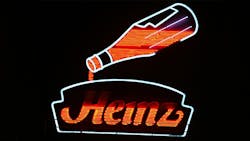Kraft Heinz Co. withdrew its $143 billion bid for Unilever two days after the approach became public, citing the Anglo-Dutch target’s reluctance to engage in discussions.
“Kraft Heinz’s interest was made public at an extremely early stage,” spokesman Michael Mullen said on February 19. “Our intention was to proceed on a friendly basis, but it was made clear Unilever did not wish to pursue a transaction. It is best to step away early so both companies can focus on their own independent plans to generate value.”
The decision to withdraw the offer came after 3G Capital and Warren Buffett’s Berkshire Hathaway Inc., which together own about half of Kraft Heinz, decided that Unilever’s negative response made a friendly transaction impossible, leaving no choice but to walk away, people with knowledge of the situation said. Both also believed that a protracted war of words wasn’t in the best interest of Kraft Heinz and would risk souring future deal opportunities, the people said, asking not to be named because the process was private.
Representatives for Berkshire Hathaway and Brazilian investment firm 3G didn’t respond to messages seeking comment on February 19.
Unilever last week rejected a $50-a-share buyout offer by Kraft Heinz, saying the proposal “fundamentally undervalues” the household-products maker. Its management fretted behind the scenes about the cost-cutting model at Kraft, which sells products like Velveeta and Jell-O, and its lack of vision for cultivating brands, people familiar with the situation said.
Hasty Proposal
Shares of Unilever jumped 13 percent to close Friday at a record 44.80 euros ($47.52) in Amsterdam. Kraft Heinz, based in Pittsburgh and Chicago, climbed 11 percent to a record in New York trading.
Kraft’s overture followed a 2.5 percent decline for Unilever’s stock in 2016, its worst annual performance since the financial crisis in 2008. Shares of European rival Nestle SA fared only marginally better, losing 2 percent.
The quick withdrawal of Kraft’s offer is surprising because Unilever’s defenses weren’t very formidable, such as its low stock ownership by management, said Ken Shea, a senior analyst at Bloomberg Intelligence. Kraft’s credibility may take a hit going forward, he said.
“The strange episode suggests that Kraft Heinz acted a bit hastily with its takeover plan, and evidently did not think it fully through,” Shea said Sunday. “Also, the timing and size of the bid -- coming just after its earnings conference call on Wednesday last week, in which it downplayed the need for acquisitions -- likely leaves their Wall Street credibility diminished.”
The proposed deal, which would have been the largest-ever takeover in the food or beverage industry, would have created a company with combined sales of $84.8 billion last year, second only to Switzerland-based Nestle. The business would be a packaged-food giant, encompassing brands like Kraft Macaroni & Cheese, Heinz Ketchup, Ben & Jerry’s ice cream and Marmite, a concentrated yeast extract spread.
Berkshire, 3G
The bid reflected consolidation desires among consumer-goods companies, which are searching for ways to increase profitability as consumer habits shift and conditions for the industry become tougher globally. Kraft Heinz itself was forged in a $55 billion combination orchestrated in 2015 by 3G and Buffett’s Berkshire, which had teamed up two years earlier on a buyout of H.J. Heinz.
Berkshire owns about 27 percent of Kraft Heinz, and 3G holds about 24 percent, according to data compiled by Bloomberg. In its 2015 annual report, Berkshire said it “will join only with partners making friendly acquisitions.”
While product overlaps between Kraft Heinz and Unilever are minimal, the enlarged company may have created concerns for antitrust officials as the business would gain considerable bargaining leverage over suppliers and supermarkets, said David Kully, an antitrust lawyer at Holland & Knight. The risk would be that a bigger Kraft Heinz would control such a wide product line that it could impose a price increase on supermarkets by threatening to withhold popular items, said Neil Wilson, an analyst at ETX Capital in London.
“It would create a giant in the sector,” said Wilson. “The combined entity would have a huge brand footprint and be able to flex bargain muscles even more.”
By Devin Banerjee
About the Author
Bloomberg
Licensed content from Bloomberg, copyright 2016.
